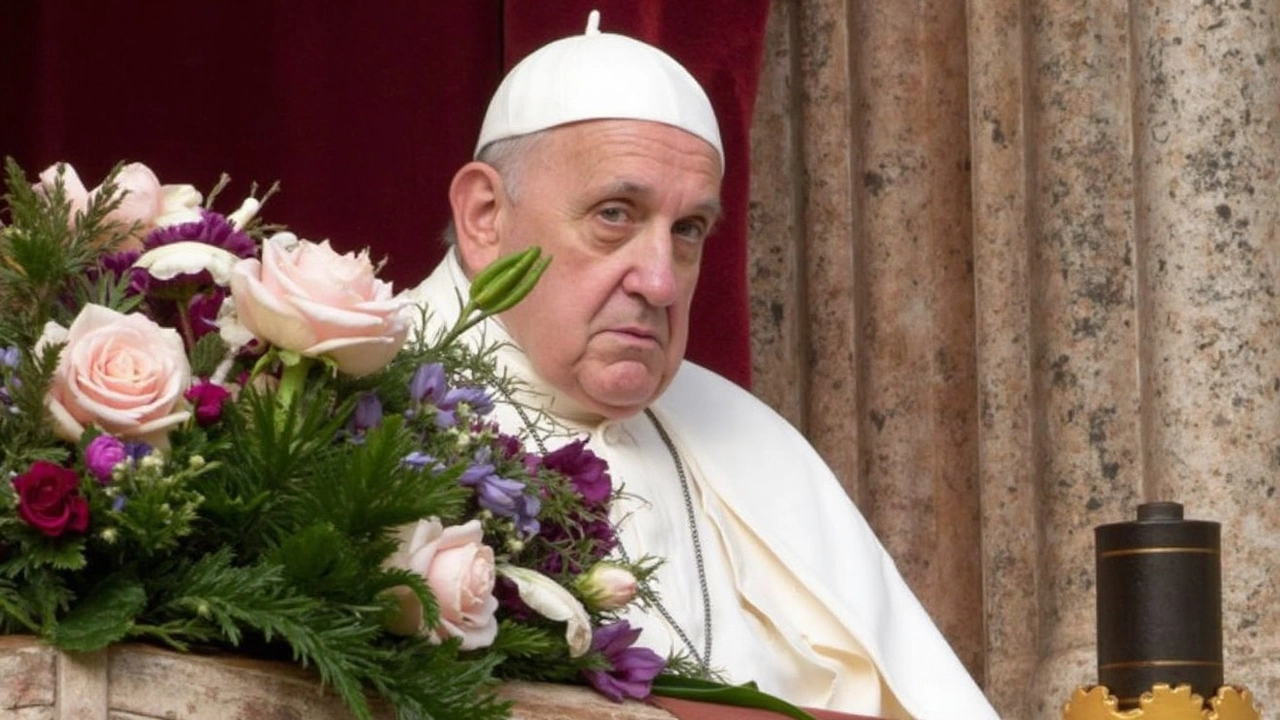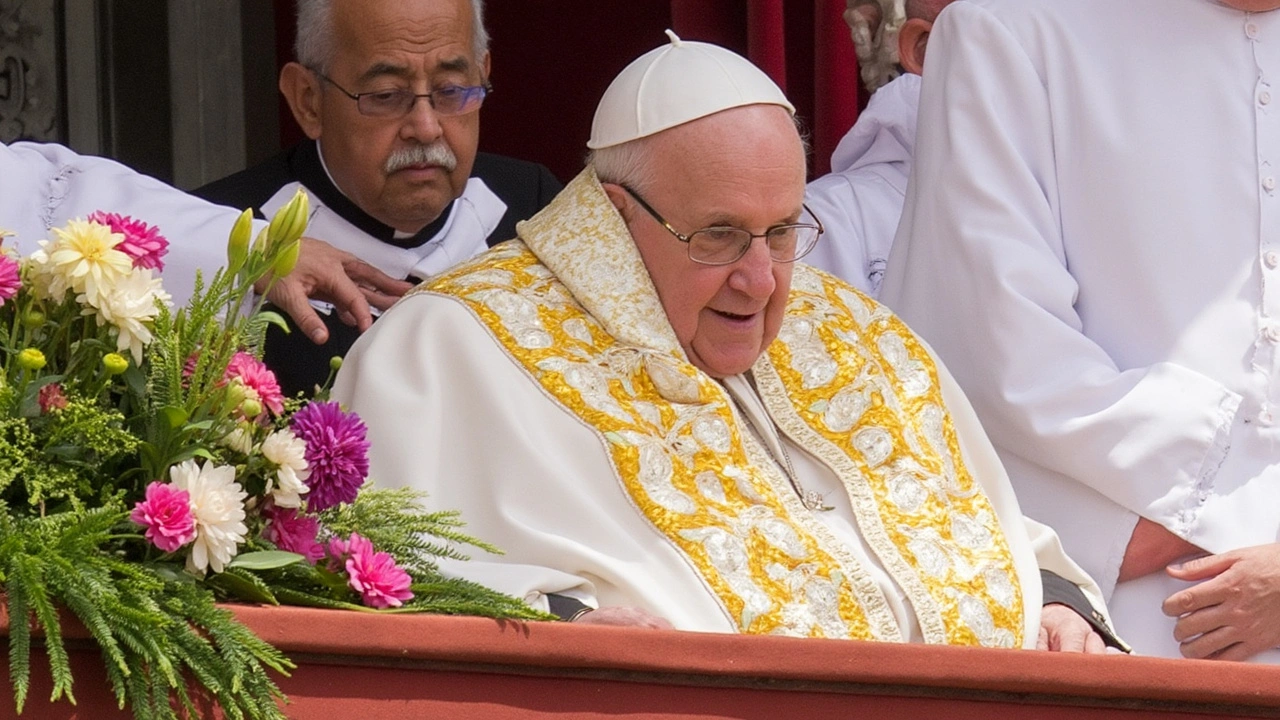Pope Francis Dies at 88 in Vatican City
The news hit early Monday—Pope Francis, the first pope from the Americas and one of the most recognizable faces in global religion, died at 88. He passed away in the early hours at the Domus Sanctae Marthae in Vatican City, his home since he became head of the Catholic Church in 2013.
According to the official statement from the Vatican, Francis' final hours were marked by a stroke that led to a coma and what doctors called “irreversible cardiovascular collapse.” His battle was worsened by a heavy catalogue of existing health issues—he’d faced recurring pneumonia, bronchiectasis in both lungs, high blood pressure, and diabetes for years. Despite these challenges, Francis remained active, choosing to meet visitors and attend public events even into his final days.
The Vatican has prepared for his body to lie in state at St. Peter's Basilica throughout the week. This gives Catholics and curious onlookers alike a rare chance to pay their respects before the grand funeral scheduled for Saturday. Crowds are already forming, many holding candles and rosaries, while television cameras capture the growing sense of loss.

World Leaders React and the Church Prepares for Succession
It’s not just Catholics mourning Francis' passing; the world has paused to reflect. The White House released archival photos showing Francis in candid conversation with former President Donald Trump and Vice President JD Vance. The timing is striking—Vance had a final, brief audience with the pope barely two days before the end. The Vatican’s own communications team quietly hinted at the pope’s declining health during the meeting, but few expected how quickly things would unravel.
King Charles III released an unusually heartfelt statement, expressing his grief and describing Francis as a man whose empathy and push for interfaith dialogues set a new tone. The British monarch particularly praised the Vatican leader’s concern for the environment and his efforts to unite fractured sides of Christianity. Similar praise echoed from capitals around the world, with flags lowered in cities as far from Rome as Sydney and Buenos Aires.
Francis' death isn’t just a notable story—it’s a seismic event for the Catholic world. The Vatican immediately declared a nine-day period of official mourning, a tradition that’s been followed for centuries. During this time, the cardinals of the church—provided they’re under 80 years old—are called to Rome’s ancient halls. Their task? Elect the next pope in the secretive conclave inside the Sistine Chapel. With dozens of languages spoken, and political and theological differences sharper than ever, there’s speculation brewing already about who might emerge as the next spiritual leader to 1.3 billion people worldwide.
All eyes now turn to Rome. Priests and bishops from every continent are booking flights. In Singapore, Cardinal William Goh led prayers for Francis’ soul, his voice cracking as he remembered the "people's pope." Services across Asia, the Americas, and Africa have followed suit—a sign of how Francis touched corners of the globe that earlier popes barely reached.
The Catholic Church stands at a crossroads. Francis, who chose to live simply and always seemed more comfortable mingling in crowds than sitting on thrones, leaves behind a legacy of humility and change. With his passing, the church enters a period of uncertainty—and anticipation—as Catholics everywhere wonder who will step onto the Vatican balcony next.


 Sports
Sports
Hugh Fitzpatrick
April 22, 2025 AT 18:18Well, look at that, the world’s most relatable pontiff has finally taken a permanent nap. Sure, we’ll miss his casual handshakes, but hey, at least we won’t have to hear about his latest sushi adventure again. The Church can finally get back to the good old incense and candlelight vibe, no more Instagram selfies.
george hernandez
April 24, 2025 AT 19:48The passing of Pope Francis feels like the end of an era where the Vatican finally tried to wear a pair of sneakers that actually fit. He was the first from the Americas, a true trailblazer who swapped papal robes for a more down‑to‑earth vibe. His dedication to climate action was like a breath of fresh air in the marble halls of Rome. He managed to bring the global south into conversations previously dominated by Eurocentric narratives. Even the most stubborn cardinals had to concede that his emphasis on mercy over doctrine was a paradigm shift. The sheer number of people who lined up just to glimpse his humble smile is a testament to his unexpected popularity. He made the Pope seem less like a distant monarch and more like your neighborhood priest who actually cares about the local soccer team. His love for the poor wasn’t just a talking point; it was a lived experience that inspired countless initiatives worldwide. While critics claimed he was too political, his political engagement was rooted in social justice, not partisan games. He opened doors for interfaith dialogue, sitting down with leaders from diverse religions without a hint of pretension. The Pope’s simple living-choosing a modest apartment over a gilded palace-sent a powerful message about humility. He turned traditional liturgies into moments of inclusivity, inviting people of all backgrounds to feel welcome. The world will now watch closely as the College of Cardinals scramble to find a successor who can balance tradition with the progressive momentum he set. The legacy he leaves behind is a complex tapestry of compassion, controversy, and charismatic leadership that will be dissected for decades. In short, the ‘people’s Pope’ has left an indelible mark that will challenge and inspire the Catholic Church for generations to come.
bob wang
April 26, 2025 AT 21:18Dear faithful and observers alike, it is with profound solemnity, and an abundance of commas, that we acknowledge the departure of His Holiness Pope Francis; his tenure, marked by unprecedented pastoral outreach, will undoubtedly be etched into the annals of ecclesiastical history; may his soul rest in eternal peace 😊.
Seyi Aina
April 28, 2025 AT 22:48Man, another pope gone and the church’s gonna be stuck debating who’s next while the rest of us keep scrolling. He tried to be cool but ended up just another headline. Honestly, the whole thing feels like a lazy reality TV plot.
Alyson Gray
May 1, 2025 AT 00:18Oh my gosh, this is just heartbreaking! I can hardly breathe thinking about the world without his gentle smile. He was more than a leader; he was a beacon of hope for the marginalized. My heart aches for all the souls he touched. The tears just keep coming, and I’m left clutching his words like a lifeline. I wish I could have been there to say goodbye in person. His legacy will live on in every act of kindness we do. I’m going to keep his memory alive by volunteering at my local shelter. Please, let’s all honor him by continuing his work.
Shaun Collins
May 3, 2025 AT 01:48Another pope, another round of drama. He was flashy but the church needed real change.
Chris Ward
May 5, 2025 AT 03:18Actually i think the whole hype around him was overblown, the church was still the same old bog. But hey, maybe it's a good chance for a fresh start.
Heather Stoelting
May 7, 2025 AT 04:48Let’s keep his spirit alive! Keep pushing for justice and love everywhere
Travis Cossairt
May 9, 2025 AT 06:18yeah, it’s sad but the world keeps turning. we’ll see who steps up next.
Amanda Friar
May 11, 2025 AT 07:48Wow, talk about a surprise! Who knew the papacy could be so dramatic? Guess we’ll have to wait for the next episode of ‘Who Wants to Be the Pope?’
Sivaprasad Rajana
May 13, 2025 AT 09:18It is important to remember that leadership is about service, not power. The next pope will need to listen more than speak.
Andrew Wilchak
May 15, 2025 AT 10:48Who’s next? I'm curious.
Roland Baber
May 17, 2025 AT 12:18When we contemplate the future of the Church, we must balance tradition with compassion. The spiritual journey is not a static path but a living dialogue between the divine and the faithful.
Phil Wilson
May 19, 2025 AT 13:48From a governance perspective, the Vatican’s operational frameworks will require a robust succession plan. Integration of innovative pastoral strategies will be critical to maintain relevance in a digitized global community.
Roy Shackelford
May 21, 2025 AT 15:18Did you ever wonder why the Vatican never mentions the secret societies pulling strings? It’s all part of the grand design, folks.
Karthik Nadig
May 23, 2025 AT 16:48Exactly! And the timing of his death… too perfect. The elite don’t want a progressive pope steering the ship 🚢👀.
Charlotte Hewitt
May 25, 2025 AT 18:18Looks like the big guys are at it again, pulling strings behind the curtains. Stay alert.